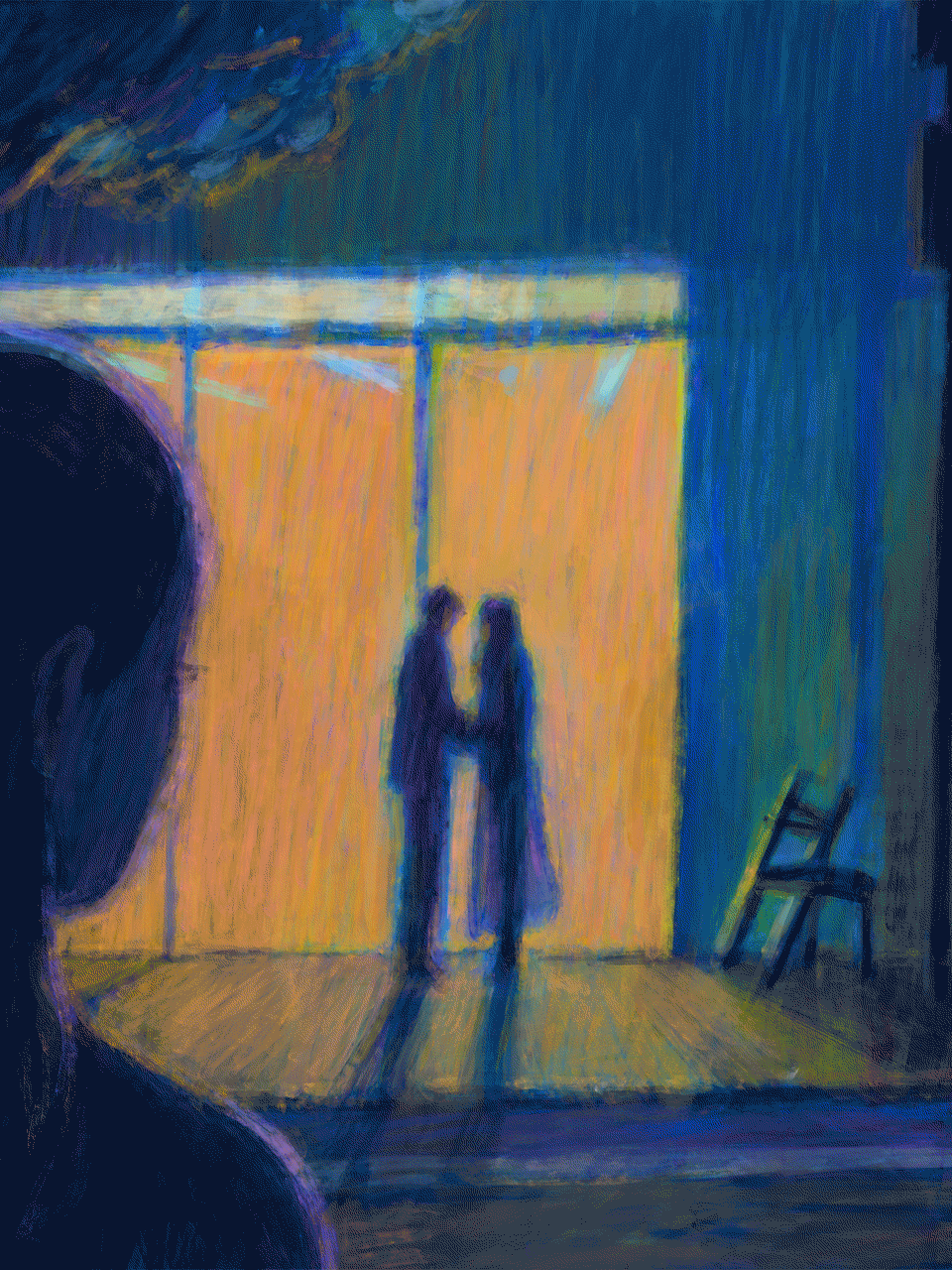This is the first story in this summer’s online Flash Fiction series. You can read the entire series, and our Flash Fiction stories from previous years, here.
I saw the couple out of the corner of my eye. I noticed them as I stepped out of a medical building. I noticed them because everything else in my peripheral vision shifted but they did not. The wind was blowing the leaves, the leaves were dying and leaping, and the couple was so still. The couple was unmoving. I was, too, looking at them. So it was the three of us as everything else moved, constant and full and wide. People brushed by our shoulders, sweeping our sides as they strode toward their destinations. People were busy. People didn’t care about the couple standing in the middle of the uneven sidewalk. People stirred around them like the sea, splashing against their ankles.
The man held her arms, his manicured fingers grasping hard.
Near the couple, there was a burned chair: garbage, darkened wood, charred remnants. That’s what had attracted my attention while I was leaving the building, the medical building, with the activated charcoal in my teeth—an abandoned chair all broken at the hips.
I imagined the impulse of someone purchasing a new chair, deciding to throw this old one away—picking it up with their knees bent and their lower back engaged, a contraction in the abdomen, separating it from their other possessions, and this object (made only for laziness or rest or gathering) being moved down a flight of wooden steps, being carried and offered to this sidewalk, sloppily, an old chair left to perish, and I imagined, too, the person who might have burned it, probably a man (men expect things to have violent ends) with a lighter or a match and the smell of a cigarette on his thumbs.
The dead chair was near the unmoving couple.
There was a balance there that I found significant, so I looked back and forth between them for six minutes, or seven. I knew the couple must have liked each other. They stared like children and kissed on the corners of their lips, and I knew.
If I followed the couple home, it was because of her hair. The building they entered was severe: red brick, steel, iron, and glass. Ugly. I waited to see what would become of them, now that they were inside a familiar place.
Time passed, and it began to rain. I thought of the burned chair sitting outside the medical building, the consequence of this location, its wooden frame peeling.
When the light turned on in the fourth window from the right, on the second floor, I felt relief. I became aroused. There was sweat, sweat on my nose, and my bowels were ready. There was water—the rain that was still coming down and the sweat that was still coming.
We were a triangle.
In the fourth window from the right, I saw pieces of them: the corner of a yellow painting, a bookcase filled to the brim, the light fixture, the tip of a houseplant’s leaf, a purple sofa, the blue walls, and then finally, finally her face in the window, her hair, her closed eyes, his hand wrapped around her neck like a scarf.
Hers was a plain face, really, as unremarkable as a piece of furniture. A face marked with freckles.
She had the most average of lips, the dark right eyebrow, and the left just as dark, long eyelashes, a nose with a bump in the middle as if it had been broken in childhood, the freckles covering her cheekbones like sand, and her resting eyelids.
I couldn’t see her eyes.
So I waited to see how long she would stay, unsmiling. The rain fell hard on my hands.
Her skin, her hair had distracted me.
It was the curl of it on her neck and on her forehead, the way it looked like a question mark, circuitous and pleading. It was the hair that had caused me to follow, to walk closely behind and wait on the street as they shuffled for their keys, the locks clicking and unclicking, their wrists turning, pressing their shoulders into doors, stumbling in, laughing, her name being called, Cannella, it sounded like Cannella, Can—cursing, letting the door slam, fast, fast up the flight of stairs, taking two steps at a time.
It made me stay longer than expected, and the rain wouldn’t stop. The rain continued. It felt heavy on my shoulders, and it rose. The water reached the backs of my knees, a flooding.
I did not think to leave, instead I walked back and forth in it, in front of the red brick, steel, iron, and glass building, her building, and in the middle of the street, which now looked like a swamp.
The gathering water rose to my thighs. It smelled of things in the moment before their dying. Objects floated past me—empty condom wrappers and large pears and extension cords, wet books full of soft paper (paper like cotton), nail clippers, peppermints, plastic spoons, dead mice, jars of unopened whipped honey. Rising water. This flood wasn’t like the ocean, but I pretended that it was. I kicked my legs. Waves formed, the current was taking me, and the rain wet my hands.
Floating, I looked at the fourth window from the right. The couple resembled a photograph, so still, the man’s manicured hand, his beautiful hand, on the neck of the woman, her eyes shut, and her dark eyebrows reaching up in mild surprise.
I don’t know how long she stayed like that, unmoving, but we must have been a sight to see—the current pulling, the thunder, me almost submerged, but looking up, up, staring at the glass, at this person with the closed eyes and the imploring hair, the neck, freckles everywhere, skin like a burned chair. ♦
